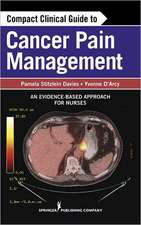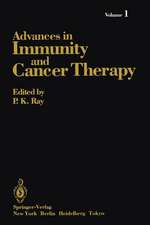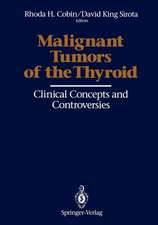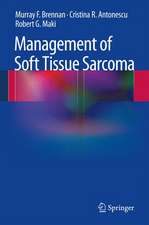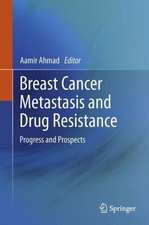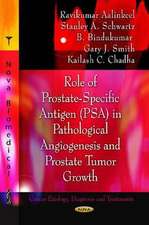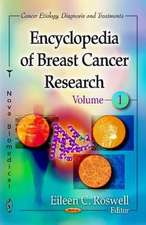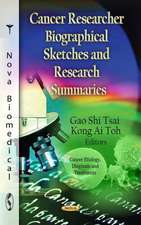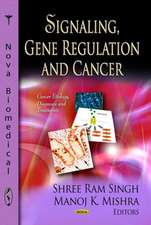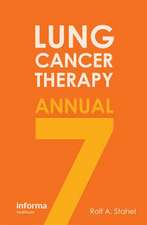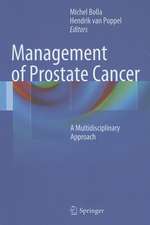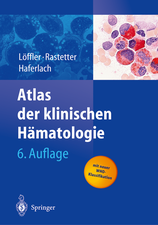The Retinoblastoma Protein: Methods in Molecular Biology, cartea 1726
Editat de Pedro G. Santiago-Cardonaen Limba Engleză Hardback – 22 feb 2018
Authoritative and practical, The Retinoblastoma Protein aims to serve as a guide to assist molecular cancer biologists in their search for understanding of the molecular functions of this preeminent tumorsuppressor.
| Toate formatele și edițiile | Preț | Express |
|---|---|---|
| Paperback (1) | 553.19 lei 38-44 zile | |
| Springer – 4 iun 2019 | 553.19 lei 38-44 zile | |
| Hardback (1) | 722.69 lei 6-8 săpt. | |
| Springer – 22 feb 2018 | 722.69 lei 6-8 săpt. |
Din seria Methods in Molecular Biology
- 9%
 Preț: 791.63 lei
Preț: 791.63 lei - 23%
 Preț: 598.58 lei
Preț: 598.58 lei - 20%
 Preț: 882.98 lei
Preț: 882.98 lei -
 Preț: 252.05 lei
Preț: 252.05 lei - 5%
 Preț: 802.70 lei
Preț: 802.70 lei - 5%
 Preț: 729.61 lei
Preț: 729.61 lei - 5%
 Preț: 731.43 lei
Preț: 731.43 lei - 5%
 Preț: 741.30 lei
Preț: 741.30 lei - 5%
 Preț: 747.16 lei
Preț: 747.16 lei - 15%
 Preț: 663.45 lei
Preț: 663.45 lei - 18%
 Preț: 1025.34 lei
Preț: 1025.34 lei - 5%
 Preț: 734.57 lei
Preț: 734.57 lei - 18%
 Preț: 914.20 lei
Preț: 914.20 lei - 15%
 Preț: 664.61 lei
Preț: 664.61 lei - 15%
 Preț: 654.12 lei
Preț: 654.12 lei - 18%
 Preț: 1414.74 lei
Preț: 1414.74 lei - 5%
 Preț: 742.60 lei
Preț: 742.60 lei - 20%
 Preț: 821.65 lei
Preț: 821.65 lei - 18%
 Preț: 972.30 lei
Preț: 972.30 lei - 15%
 Preț: 660.49 lei
Preț: 660.49 lei - 5%
 Preț: 738.41 lei
Preț: 738.41 lei - 18%
 Preț: 984.92 lei
Preț: 984.92 lei - 5%
 Preț: 733.29 lei
Preț: 733.29 lei -
 Preț: 392.60 lei
Preț: 392.60 lei - 5%
 Preț: 746.26 lei
Preț: 746.26 lei - 18%
 Preț: 962.66 lei
Preț: 962.66 lei - 23%
 Preț: 860.22 lei
Preț: 860.22 lei - 15%
 Preț: 652.64 lei
Preț: 652.64 lei - 5%
 Preț: 1055.50 lei
Preț: 1055.50 lei - 23%
 Preț: 883.87 lei
Preț: 883.87 lei - 5%
 Preț: 1141.13 lei
Preț: 1141.13 lei - 19%
 Preț: 491.89 lei
Preț: 491.89 lei - 5%
 Preț: 1038.86 lei
Preț: 1038.86 lei - 5%
 Preț: 524.16 lei
Preț: 524.16 lei - 18%
 Preț: 2122.34 lei
Preț: 2122.34 lei - 5%
 Preț: 1299.23 lei
Preț: 1299.23 lei - 5%
 Preț: 1339.12 lei
Preț: 1339.12 lei - 18%
 Preț: 1390.26 lei
Preț: 1390.26 lei - 18%
 Preț: 1395.63 lei
Preț: 1395.63 lei - 18%
 Preț: 1129.65 lei
Preț: 1129.65 lei - 18%
 Preț: 1408.26 lei
Preț: 1408.26 lei - 18%
 Preț: 1124.92 lei
Preț: 1124.92 lei - 18%
 Preț: 966.27 lei
Preț: 966.27 lei - 5%
 Preț: 1299.99 lei
Preț: 1299.99 lei - 5%
 Preț: 1108.51 lei
Preț: 1108.51 lei - 5%
 Preț: 983.76 lei
Preț: 983.76 lei - 5%
 Preț: 728.16 lei
Preț: 728.16 lei - 18%
 Preț: 1118.62 lei
Preț: 1118.62 lei - 18%
 Preț: 955.25 lei
Preț: 955.25 lei - 5%
 Preț: 1035.62 lei
Preț: 1035.62 lei
Preț: 722.69 lei
Preț vechi: 760.73 lei
-5% Nou
Puncte Express: 1084
Preț estimativ în valută:
138.29€ • 150.68$ • 116.53£
138.29€ • 150.68$ • 116.53£
Carte tipărită la comandă
Livrare economică 23 aprilie-07 mai
Preluare comenzi: 021 569.72.76
Specificații
ISBN-13: 9781493975648
ISBN-10: 1493975641
Pagini: 327
Ilustrații: XI, 200 p. 38 illus., 32 illus. in color.
Dimensiuni: 178 x 254 x 18 mm
Greutate: 0.59 kg
Ediția:1st ed. 2018
Editura: Springer
Colecția Humana
Seria Methods in Molecular Biology
Locul publicării:New York, NY, United States
ISBN-10: 1493975641
Pagini: 327
Ilustrații: XI, 200 p. 38 illus., 32 illus. in color.
Dimensiuni: 178 x 254 x 18 mm
Greutate: 0.59 kg
Ediția:1st ed. 2018
Editura: Springer
Colecția Humana
Seria Methods in Molecular Biology
Locul publicării:New York, NY, United States
Cuprins
Characterization of RB1 Deletions in Interphase and Metaphase by Molecular Cytogenetics Exemplified in Chronic Lymphatic Leukemia.- Detection of RB1 Gene Copy Number Variations using a Multiplex Ligation-Dependent Probe Amplification Method.- A Fluorescent Quantitative Multiplex PCR Method to Detect Copy Number Changes in the RB1 Gene.- Using Methylation-specific PCR to study RB1 Promoter Hypermethylation.- Detection of Aberrant DNA Methylation Patterns in the RB1 Gene.- Detection of Retinoblastoma Protein Phosphorylation by Immunoblot Analysis.- Immunohistochemical Detection of the Retinoblastoma Protein.- Immunohistochemical Detection of Retinoblastoma Protein Phosphorylation in Human Tumor Samples.- Detection of CCND1 Locus Amplification by Fluorescence in situ Hybridization.- Detection of CCND1 Gene Copy Number Variations using Multiplex Ligation-dependent Probe Amplification and Fluorescence in situ Hybridization Methods.- Detection of p16 Promoter Hypermethylation by Methylation-specific PCR.- Immunohistochemical Detection of p16 in Clinical Samples.- Detection of E2F-DNA Complexes Using Chromatin Immunoprecipitation Assays.- Detection of E2F-induced Transcriptional Activity Using a Dual Luciferase Reporter Assay.- Detection of HPV E6/E7 mRNA in Clinical Samples using RNA in situ Hybridization.- CRISPR/Cas9 Mediated Knockout of Rb1 in Xenopus tropicalis.
Textul de pe ultima copertă
This volume covers the mechanisms of pRb inactivation detailing repressive mechanisms commonly associated to cancer, and representative of the experimentally relevant tests used in the establishment of cancer diagnosis and prognosis. Chapters contain protocols and in-depth discussions for commonly used experimental approaches to assess the status and function of components of the pRb pathway, including pRb itself, in cell lines and biological samples.Written in the highly successful Methods in Molecular Biology series format, chapters include introductions to their respective topics, lists of the necessary materials and reagents, step-by-step, readily reproducible laboratory protocols, and tips on troubleshooting and avoiding known pitfalls.
Authoritative and practical, The Retinoblastoma Protein aims to serve as a guide to assist molecular cancer biologists in their search for understanding of the molecular functions of this preeminent tumorsuppressor.
Authoritative and practical, The Retinoblastoma Protein aims to serve as a guide to assist molecular cancer biologists in their search for understanding of the molecular functions of this preeminent tumorsuppressor.
Caracteristici
Includes cutting-edge methods and protocols Provides step-by-step detail essential for reproducible results Contains key notes and implementation advice from the experts


